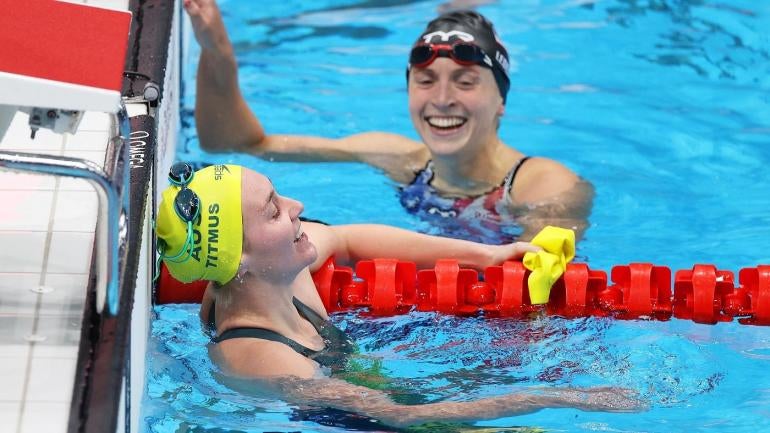
When it comes to emotional investment for most casual sports fans who watch the Olympics, it's largely the individual performances of a few high-profile athletes, in addition to overall representation of country, that drives interest.
Rivalries exist here and there, but they're not that common, and they're normally positioned in nation-vs.-nation context rather than athlete-vs.-athlete. This is a feature-not-bug attribute for the Olympics; after all, it's freakishly hard for most to make it this far. And since they only hold these things once every four years (when pandemics aren't afflicting the planet), the Games don't offer a lot of fertile opportunity for familiarity between opponents. Sure, world championships provide proving grounds for healthy, familiar competition to brew. But the reality is most of the world doesn't pay attention to what happens in Olympic sports when the competition isn't happening on an Olympic stage.
So with that in mind, the developments in the pool over the past fews days between Katie Ledecky and Ariarne Titmus have been something special for swimming. Ledecky entered these Games as the biggest star in her sport, effectively inheriting that title from Michael Phelps. Titmus is now angling alongside her, and since the Paris 2024 Games are only three years away, there's a big opportunity for swimming to have something as notable as it is rare: a multi-Olympics rivalry between two household-name swimmers.
Ledecky was already there, while Titmus cemented that status with her gold medal-winning swim Wednesday morning (Tokyo time) in the 200-meter freestyle.
It would have been really something if the 20-year-old Australian and the 24-year-old Ledecky had traded turns atop the podium this week in their 200- and 400-meter races, but it was Titmus (favored in both) who nabbed a pair of golds in both events. Ledecky vs. Titmus Vol. I, on Monday morning in Japan, was one of the highlights of the Games so far, with the swimmers finishing a mere .67 of a second apart.
Wednesday morning in Tokyo saw Titmus roar from behind to snatch not only her second gold medal in three days, but also earn an Olympic record with her 1:53.50 finish. Ledecky, in a stunner, touched in 1:55.21 -- merely good for fifth. This marks the first time she's failed to find the podium in an Olympic event. It was disappointing for Ledecky, but there is a huge caveat to consider. Ledecky was taking on the most grueling session any swimmer will endure at these Games.
In the span of approximately 75 minutes, Ledecky competed in the 200 free final and the 1,500 free final. As expected, she cruised (15:37.54) her way to the gold in the latter, which made its Olympic debut in women's swimming. Taking into account other preliminary swims, semifinal heats and medal races, Ledecky swam approximately 4,000 meters in a 48-hour period. That's absurd. It's what separates her from everyone else in her sport. Ledecky is a freestyle specialist in this regard; not even Titmus was chasing dreams of competing in the 800 (that final will come Friday) or the 1,500.
Ledecky has her named attached the top 12 times in the history of the women's 1,500 free. (In a great moment of Olympic television on Tuesday night in the States, Ledecky was even more thrilled to see her teammate, Erica Sullivan (15:41.41), push her way to a competitive silver.) Even attempting the 200 free and the 1,500 free is admirable. To finish fifth in one and easily win the other is, flatly, what separates Ledecky from the rest in her sport.
She's a marvel. And she's not done yet. Ledecky is highly likely to win gold when she races in the 800 later this week. When that happens, she'll move into second place for most individual golds (six) by a swimmer in history (trailing only, of course, Michael Phelps, who has a godly haul of 13).
The question becomes: Will the losses to Titmus fuel Ledecky to train and try this again -- the 200 free and the 400 free -- three years from now in Paris? We should hope she wants to. Ledecky is such a committed competitor, the next step would be not just to to medal in all her events in 2024 (she's given no indications of impending retirement at this stage) but to potentially win them. If there's a swimmer on this planet who can do it, it's her. Again, the question is if she'll pursue it. We know Titmus will be back; at 20 years old, her prime is probably cresting three years from now.
Titmus vs. Ledecky is compelling theater for sports -- and a boon for Olympics interest. They're inspiring competitors who raise the bar against each other and for themselves. Swimming will always appeal to the masses at every Summer Olympics, but if you can provide a head-to-head that people are familiar with? It's the best of everything these Games can offer.
As long as they're both in the pool at the same time, it will make for appointment viewing and, as has been proven in Tokyo, historic swimming. Let's root for a rendezvous in Paris.
![[object Object] Logo](https://sportshub.cbsistatic.com/i/2020/04/22/e9ceb731-8b3f-4c60-98fe-090ab66a2997/screen-shot-2020-04-22-at-11-04-56-am.png)
















